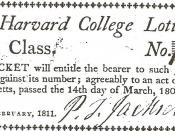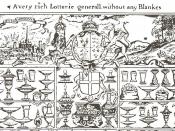The Religious Beliefs of Others
"The Lottery"
In Shirley Jackson's "The Lottery," there is a conflict between male authority and female resistance. "The Lottery" attempts to explain an obscured way of controlling female sexuality. In this short story the women are not allowed to take part in the drawing. This is significant because their exclusion from the lottery leaves their fate to be decided by the males in the society. The society in this story is patriarchal. I believe one theme in this story is that people forget the importance of life until they loose their own.
Jackson's insights and observations about man and society are disturbing, and in the case of "The Lottery," they are shocking. The lottery enforces an unfair distinction in class status between men and women. Women are subordinate in the social power structure of the village, as shown when Mrs.
Hutchinson's family is chosen in the first round. Objecting that her daughter and son-in-law did not " take their chance," (269) Mr. Summers reminds her that "daughters draw with their husbands' families," (269) showing that power is exclusively held in the hands of males in the family. Women, as housewives, must submit to their husbands' power over them because as men in the work force, they are linked to the community economically and provide for the family. Mrs. Hutchinson, however, rebels against this male domination. Arriving late, she raises suspicions of resistance to everything the lottery represents. When her family name is called, she pushes her husband, "Get up there, Bill!" (268). In doing so, she acts rebelliously, ironically contradicting custom by reversing the accepted power relation between husbands and wives. In her name Hutchinson, Jackson alludes to the religious reformer Anne Hutchinson, who, because she...



"Male Authority-Female Resistance"
The opening sentence in the second and third paragraphs sounds like it was cribbed from one of the works cited. The grammar and the evidence are reasonable, but there is little sense of why "The Lottery" is important and relevant in explaining female resistance within a patriarchical society. It is also largely incomprehensible for someone who hasn't read the short story or any of the author's work.
4 out of 4 people found this comment useful.